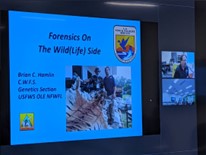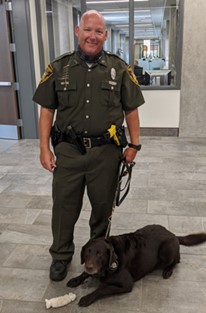Forestry & Natural Resources
FNR Class Spotlight: Wildlife & Environmental Forensics
You may have watched CSI or learned about forensic science from a book, show or movie, but there is so much more to that world than what you see on TV.

In her Wildlife and Environmental Forensics class, Dr. Marisol Sepulveda teaches her students about the forensics world, from the basics of different types of investigations to various tools and procedures utilized to solve crimes using morphological, chemical and biological analysis of evidence and more.
And this isn’t just learning from a book, the class learns from actual closed criminal cases and features several guest speakers from the field, who share their journey to their current occupation as well as actual cases they have been a part of that apply their wildlife backgrounds and forensic skills.
“For me it is actually quite interesting, because as a wildlife and pre-vet student, I feel like this class is the perfect mix of those because it has the pathology part with certified veterinarians working in the wildlife field,” senior Kathryn Snyder, who is a wildlife major and is pursuing a pre-vet educational goal said.
Labs include crime scene investigation, forensic entomology, mammalian hair identification, fingerprint analysis and environmental chemistry.

In a final project, students have to recreate and present facts from a true wildlife/environmental crime case in a video and share and discuss it with the class, putting into practice what they have learned in lectures and labs.
On Sept. 9, the class was joined in person by Indiana conversation officer Matt Tholen and his K-9 partner Drake. Wildlife forensic scientist Brian Hamlin, of the U.S. Fish and Wildlife national forensic lab in Ashland, Oregon, also joined the class via zoom.
Tholen explained what he does as a conservation officer, including protecting deer, fish and wildlife, but also brought the students in to the forensics side of his job. Drake tracks people, guns and ammo, deer and turkey meet and even ginseng. Tholen discussed cases he and Drake have worked and the class even got to see Drake in action, tracking a shotgun shell hidden in the classroom.

Hamlin, meanwhile discussed some of his cases, ranging from species identification to criminalistics and chemistry.
“I think it helps to be able to put a face to a job and kind of get that person’s personality,” junior Mackenzie Nobbe, a wildlife and animal sciences double major, said. “To be able to be so hands on with the dog helps us to remember all that he (officer Tholan) was talking about and the importance of it. It is really invigorating to get to see that side of their job.
“I knew that wildlife forensics was a career from watching crime shows, where there are entomologists and biologists and that kind of thing, but I didn’t know the full length of what everybody does and how important it is until I took this class.”
Sepulveda crafted the class five years ago to cover the theory and technical aspects of wildlife and environmental forensics and added more hands-on activities to class with lab sections beginning in 2018.
“I feel like it makes the entire class feel a lot more real and applicable to real life (when we have speakers and see actual cases), rather than just saying you can use what you learn in this class to pursue these career paths,” senior forestry and wildlife double major Aimee Parcell said. “To get to actually see people who have done so seems really beneficial.”






